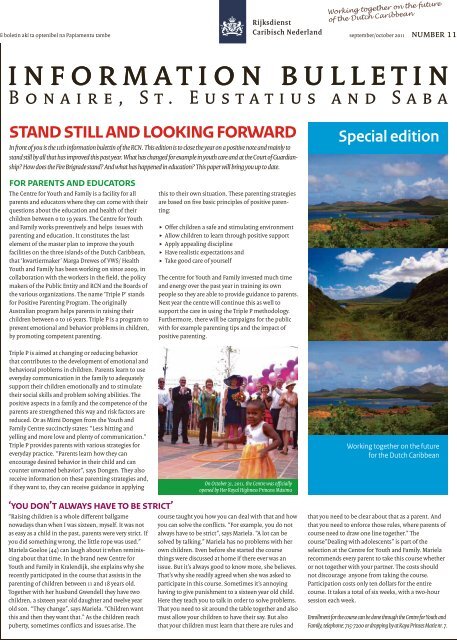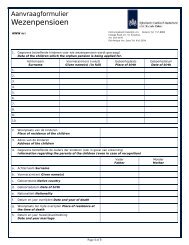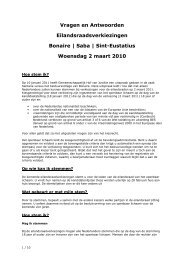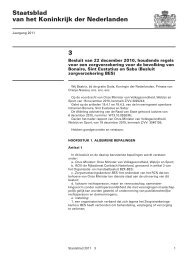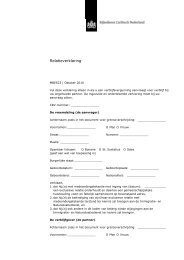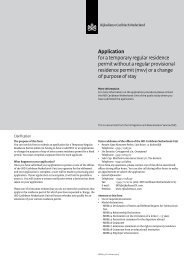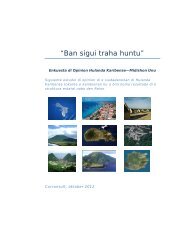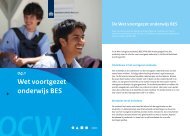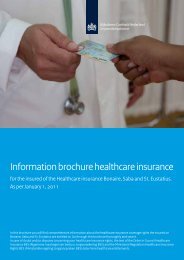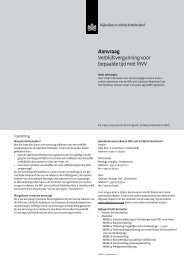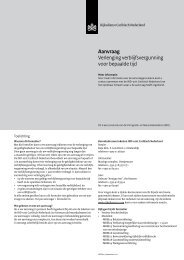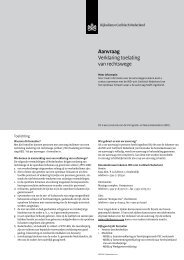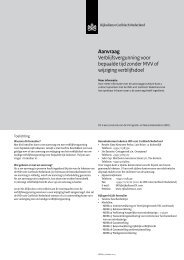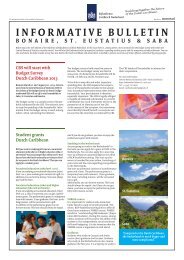aki - Rijksdienst Caribisch Nederland
aki - Rijksdienst Caribisch Nederland
aki - Rijksdienst Caribisch Nederland
You also want an ePaper? Increase the reach of your titles
YUMPU automatically turns print PDFs into web optimized ePapers that Google loves.
Working together on the future<br />
of the Dutch Caribbean<br />
boletin akí ta optenibel na Papiamentu tambe september/october 2011<br />
NUMBER 11<br />
I N F O R M A T I O N B U L L E T I N<br />
B O N A I R E , S T . E U S T A T I U S A N D S A B A<br />
STAND STILL AND LOOKING FORWARD<br />
In front of you is the 11th information bulein of the RCN. This edition is to close the year on a positive note and mainly to<br />
stand still by all that has improved this past year. What has changed for example in youth care and at the Court of Guardianship?<br />
How does the Fire Brigrade stand? And what has happened in education? This paper will bring you up to date.<br />
FOR PARENTS AND EDUCATORS<br />
The Centre for Youth and Family is a facility for all<br />
parents and educators where they can come with their<br />
questions about the education and health of their<br />
children between 0 to 19 years. The Centre for Youth<br />
and Family works preventively and helps issues with<br />
parenting and education. It constitutes the last<br />
element of the master plan to improve the youth<br />
facilities on the three islands of the Dutch Caribbean,<br />
that ‘kwartiermaker’ Marga Drewes of VWS/ Health<br />
Youth and Family has been working on since 2009, in<br />
collaboration with the workers in the field, the policy<br />
makers of the Public Entity and RCN and the Boards of<br />
the various organizations. The name 'Triple P' stands<br />
for Positive Parenting Program. The originally<br />
Australian program helps parents in raising their<br />
children between 0 to 16 years. Triple P is a program to<br />
prevent emotional and behavior problems in children,<br />
by promoting competent parenting.<br />
Triple P is aimed at changing or reducing behavior<br />
that contributes to the development of emotional and<br />
behavioral problems in children. Parents learn to use<br />
everyday communication in the family to adequately<br />
support their children emotionally and to stimulate<br />
their social skills and problem solving abilities. The<br />
positive aspects in a family and the competence of the<br />
parents are strengthened this way and risk factors are<br />
reduced. Or as Mimi Dongen from the Youth and<br />
Family Centre succinctly states: “Less hiing and<br />
yelling and more love and plenty of communication.”<br />
Triple P provides parents with various strategies for<br />
everyday practice. “Parents learn how they can<br />
encourage desired behavior in their child and can<br />
counter unwanted behavior”, says Dongen. They also<br />
receive information on these parenting strategies and,<br />
if they want to, they can receive guidance in applying<br />
‘YOU DON’T ALWAYS HAVE TO BE STRICT’<br />
“Raising children is a whole different ballgame<br />
nowadays than when I was sixteen, myself. It was not<br />
as easy as a child in the past, parents were very strict. If<br />
you did something wrong, the lile rope was used.”<br />
Mariela Goeloe (44) can laugh about it when reminiscing<br />
about that time. In the brand new Centre for<br />
Youth and Family in Kralendijk, she explains why she<br />
recently participated in the course that assists in the<br />
parenting of children between 11 and 18 years old.<br />
Together with her husband Gwendell they have two<br />
children, a sixteen year old daughter and twelve year<br />
old son. “They change”, says Mariela. “Children want<br />
this and then they want that.” As the children reach<br />
puberty, sometimes conflicts and issues arise. The<br />
this to their own situation. These parenting strategies<br />
are based on five basic principles of positive parenting:<br />
Offer children a safe and stimulating environment<br />
Allow children to learn through positive support<br />
Apply appealing discipline<br />
Have realistic expectations and<br />
Take good care of yourself<br />
The centre for Youth and Family invested much time<br />
and energy over the past year in training its own<br />
people so they are able to provide guidance to parents.<br />
Next year the centre will continue this as well to<br />
support the care in using the Triple P methodology.<br />
Furthermore, there will be campaigns for the public<br />
with for example parenting tips and the impact of<br />
positive parenting.<br />
On October 31, 2011, the Centre was officially<br />
opened by Her Royal Highness Princess Máxima<br />
course taught you how you can deal with that and how<br />
you can solve the conflicts. “For example, you do not<br />
always have to be strict”, says Mariela. “A lot can be<br />
solved by talking.” Mariela has no problems with her<br />
own children. Even before she started the course<br />
things were discussed at home if there ever was an<br />
issue. But it’s always good to know more, she believes.<br />
That’s why she readily agreed when she was asked to<br />
participate in this course. Sometimes it’s annoying<br />
having to give punishment to a sixteen year old child.<br />
Here they teach you to talk in order to solve problems.<br />
That you need to sit around the table together and also<br />
must allow your children to have their say. But also<br />
that your children must learn that there are rules and<br />
Special edition<br />
Working together on the future<br />
for the Dutch Caribbean<br />
that you need to be clear about that as a parent. And<br />
that you need to enforce those rules, where parents of<br />
course need to draw one line together.” The<br />
course”Dealing with adolescents” is part of the<br />
selection at the Centre for Youth and Family. Mariela<br />
recommends every parent to take this course whether<br />
or not together with your partner. The costs should<br />
not discourage anyone from t<strong>aki</strong>ng the course.<br />
Participation costs only ten dollars for the entire<br />
course. It takes a total of six weeks, with a two-hour<br />
session each week.<br />
Enrollment for the course can be done through the Centre for Youth and<br />
Family, telephone: 715-7200 or dropping by at Kaya Prinses Marie nr. 7.


